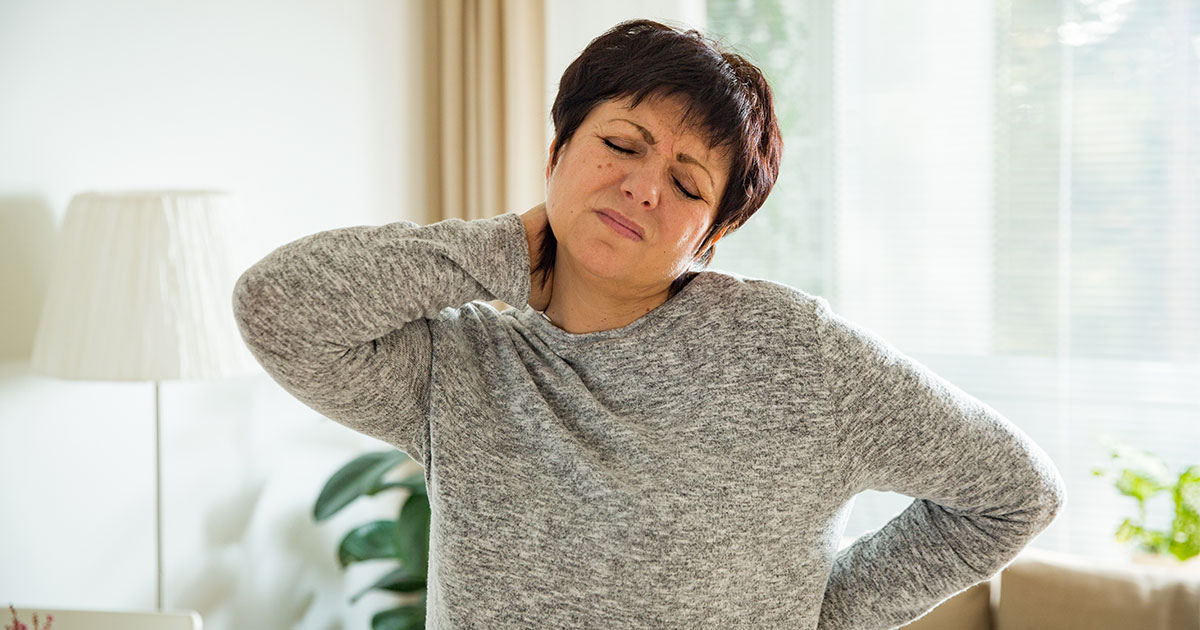Menopause and Muscle Aches
So, you are experiencing hot flashes and other unpleasant symptoms of menopause. But did you know menopause and muscle aches can also arise?
Muscle tension, or myofascial pain syndrome, affects the connective tissue that covers our muscles. Inflammation of this tissue causes pain; it can come and go or be a constant problem. It occurs due to the hormonal changes a person goes through during menopause.
Estrogen levels plummet in a person in menopause and cortisol levels rise. Cortisol is a stress hormone, so you know that cannot be a good thing. Blood pressure and blood sugar rises in response to the increased levels.
This elevation in cortisol causes the muscles to tighten and become fatigued. To add to this problem, the soothing progesterone that people have in their bodies also drops. Pain and achiness are the results.
Muscle Pain Symptoms to Watch For
Any time you are experiencing muscles aches or joint pain, talk to your doctor. If you are going through menopause it could be related to the stage of your life, and they can help you navigate a symptom management plan. Some symptoms you might experience include:
- Joint pain.
- Joint stiffness.
- Muscle pain.
- Muscle stiffness.
- Muscle weakness.
- Aching in the legs or leg cramps.
- Restless legs.
- Swollen ankles.
- Joint inflammation and tenderness.
Do you experience any of these symptoms? If yes, you aren't alone. Continue reading the next section to learn about how to ease your pain and discomfort.
Easing the Pain
- Watch what you eat and keep it healthy. Try to stick to a diet that is high in nutrients. Stay away from processed foods and refined carbohydrates, as they only add fuel to the inflammation. It is better to eat wholesome foods, like fruits, that are high in antioxidants.
- Forego the java. Caffeine may aggravate the pain by making your muscles more sensitive to pain and causing them to tense up much more. Keep your caffeine intake at a minimum to avoid pain.
- Quit smoking. Nicotine can make your muscle tension worse. Besides, it isn’t good for you anyway. Kick the nasty habit.
- Drink plenty of water. Water is used in your body for many functions so you need to keep hydrated. Drink eight glasses per day to keep joints lubricated and allow your body to do its work effectively.
- Daily activity and exercise. Stretching exercises will keep your muscles limber and help release the tension from them. You need to exercise regularly to keep your muscles in top shape.
- Use pain relievers as needed. There is nothing wrong with taking Tylenol or ibuprofen for pain relief. You may also want to try heat pads, yoga and massage therapy. Some people find that acupuncture helps as well. Do what you think helps.
- Be sure to get enough sleep. It is important to get a good night’s sleep; this is the time your body rejuvenates. Sleep is a good stress reliever, so it is imperative to get appropriate rest. Taking a high-quality menopause supplement can help to ensure that you are taking in enough essential vitamins and minerals.
Supplements That Help With Muscle Aches
Every person is different, and while one management technique may work for someone else, it might not work for you. As mentioned above, certain vitamins, minerals and supplements can aid in the reduction of muscle aches. We are going to explain what the best ones are and how they help, so you can see if the supplement option is right for you.
Turmeric
This is a natural cooking ingredient that is now also often found in teas. So, if you don't like cooking with it, brew up a turmeric tea latte! Consuming this ingredient can help relieve pain, as turmeric is known to decrease inflammation.
Cherry Juice Extract
Like other red fruits and vegetables, cherries contain anti-inflammatory benefits. In turn, this may help reduce your pain. Research shows that those who have a glass of cherry extract or a handful of cherries each day have experienced less pain. However, if you are a diabetic, refrain from this option due to it being high in sugar.
Omega-3 Fatty Acids
This supplement is incredibly important and can be found in fish oil, tuna, salmon, sardines, tofu and walnuts. It has been used to help manage the joint swelling that comes with rheumatoid arthritis, so it may be a good option for your menopause joint and muscle aches.
Talk to Your Doctor
Talk to your doctor about what is the best course of treatment if the home remedies do not help you. Your doctor will try hormonal balancing therapies to get your body back in equilibrium and alleviate your menopausal symptoms. You deserve to live without pain holding you back.

